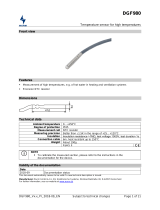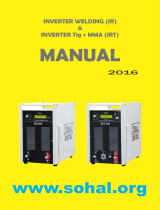
TABLE OF CONTENTS
0740 800 217 © ESAB AB 2018
1
READ THIS FIRST.................................................................................... 5
2
INTRODUCTION....................................................................................... 6
3
TECHNICAL DATA ................................................................................... 8
4
WIRING DIAGRAM................................................................................... 11
4.1 Component description ......................................................................... 12
4.2 Diagram ................................................................................................... 14
4.3 Placement of the components .............................................................. 16
5
DESCRIPTION OF OPERATION.............................................................. 17
5.1 1 MMC unit .............................................................................................. 17
5.1.1 1AP1 MMC control board ..................................................................... 17
5.1.1.1 1AP2 MMC panel .............................................................................. 18
5.2 2 Mains module....................................................................................... 18
5.2.1 2AP1 Interference suppressor board (EMC-board).............................. 18
5.2.2 2AP2 Rectifier board ............................................................................ 19
5.2.2.1 2AP2 Block diagram.......................................................................... 19
5.2.2.2 2AP2:1 Voltage regulator .................................................................. 20
5.2.2.3 2AP2:2 Pulse generator .................................................................... 20
5.2.2.4 2AP2:3 Thyristor driver...................................................................... 21
5.2.2.5 2AP2:4 Charging circuit..................................................................... 21
5.2.2.6 2AP2:5 Mains supply monitoring....................................................... 22
5.2.2.7 2AP2 Component positions............................................................... 23
5.2.3 2AP3 Power supply board.................................................................... 24
5.2.3.1 2AP3 Block diagram.......................................................................... 24
5.2.3.2 2AP3:1 Power supply ........................................................................ 24
5.2.3.3 2AP3:2 +25V PWM driver ................................................................. 25
5.2.3.4 2AP3:3 +25V power supply ............................................................... 25
5.2.3.5 2AP3:4 +12V power supply ............................................................... 26
5.2.3.6 2AP3 Component positions............................................................... 27
5.2.4 2AP4 Filter board ................................................................................. 28
5.2.4.1 2AP4 Block diagram.......................................................................... 29
5.2.4.2 2AP4 Component position................................................................. 29
5.3 5 Cooling unit.......................................................................................... 30
5.3.1 5AP1 Block diagram............................................................................. 30
5.4 15 The power module............................................................................. 30
5.4.1 15AP1 Power board ............................................................................. 31
5.4.1.1 15AP1 Block diagram........................................................................ 31
5.4.1.2 15AP1:1 Gate drivers ........................................................................ 33
5.4.1.3 15AP1:2 Switching circuit.................................................................. 34
5.4.1.4 15AP1:3 Overvoltage and undervoltage protection........................... 35
5.4.1.5 15AP1:4 Temperature protection....................................................... 36
5.4.1.6 15AP1:5 Fan control.......................................................................... 37






















